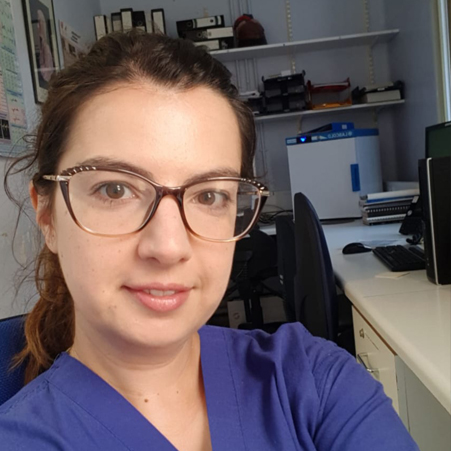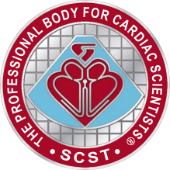To support Healthcare Science Week 2024 we will be showcasing several cardiac scientists inspirational career journeys.
Sara Delgado, Clinical Cardiac Scientist at Royal Brompton & Harefield Hospitals, specialising in Echocardiography
A healthcare science journey from Portugal to STP equivalence and beyond.
“What inspired me from the onset?
A moment that struck me at the onset of my career was as a first-year student at university; one of our professors told us that “we should treat our patients as we would like our parents to be treated”. A vision that I’ve developed my career and work ethic in healthcare science around with this shared purpose in mind.
Where did it all start?
My career in cardiac healthcare science began when I enrolled onto a four-year full-time BSc Honours degree; becoming a student cardio-respiratory physiologist in Portugal. A degree divided between academic and clinical placement, where I learned about cardiovascular, respiratory, and sleep physiology and pathology, respectively. In addition to how to use specialist diagnostic equipment and interpret clinical information to make key decisions.
Whilst working in Portugal performing and reporting cardiac non-invasive and spirometry tests, I sought to develop further and enrolled onto a self-funded master’s degree in Cardiopulmonary Technology. During these two years, I expanded my physiological, biological, and genetic knowledge, studying the determinants for electric cardiac activity, as well as invasive procedures to diagnose and treat arrhythmias.
Moving to the UK…
After four years of working in sleep medicine and breathing disorders, I sought a new challenge. Following my interests, I pursued a position within cardiovascular medicine in London; performing a range of non-invasive diagnostic investigations in cardiology. Whilst working in the private sector has its advantages, it was very different from what I was used to. My heart and soul still lay in the public health sector and this is where I found the area where I could see my career going forward; the echocardiography field. The ability to see a beating heart by “just” putting a probe on a person’s chest still amazes me to this day – almost 10 years after.
How my journey in echocardiography began
My echocardiography journey began at Northwick Park Hospital, where I began my training in performing and reporting adult echocardiography assessments to British Society of Echocardiography (BSE) standards. Soon after completing my accreditation, I began to supervise and train students, whilst gaining experience in other areas of echocardiography, namely, stress and transoesophageal echocardiography, respectively. After a few years in this field, I grew an appreciation of the variance in international guidelines and wanted to broaden my knowledge to better help our patients. So, I obtained the adult transthoracic echocardiography accreditation with the European Association of Cardiovascular Imaging.
As my knowledge and skillset grew, I became more involved with the education and training of senior echocardiographers, in addition to supporting and facilitating quality assurance projects. Taking the form of audits, service evaluations, and reviews of our local protocols. All with the aim of enhancing service standards and enabling continual service improvement.
Moving to a tertiary centre
At the end of 2019, I was presented with a challenge; I could stay in my secure position or step outside of my comfort zone and test myself at a tertiary cardiovascular centre (Royal Brompton & Harefield Hospitals); I’ve never looked back. I took the opportunity to challenge myself and to learn from some inspiring echocardiographers and consultant cardiologists alike (Professor Roxy Senior and Cathy West to name a couple who’ve inspired my career). Not only was I exposed to pre- and post-operative echocardiography, but also to patients with complex cardiac and lung conditions, including but not limited to valvular heart disease, cardiomyopathies, and pulmonary hypertension. I enjoyed the strong emphasis placed on performing echocardiograms to a high level using advanced techniques such as speckle tracking echocardiography, 3D echocardiography, and contrast echocardiography. I was a newbie again and I was loving it!
Since then, I’ve further developed my expertise by continuing with an ongoing audit to evaluate the usage of contrast echocardiography. We aimed to implement this advanced technique in alignment with the latest guidelines1 integrating contrast echocardiography into the routine practice of our department (Figure 1). We tackled queries and misconceptions in workshops and meetings, promoted upcoming contrast events, and implemented a protocol to quickly identify the need for contrast. A key step to decreasing the time for adding this technique to the baseline study. Alongside this, my eyes were opened to a new world of performing stress echocardiography using different methods in patients with ischemic disease, valvular heart disease, cardiomyopathies, and congenital heart disease.

Figure 1. Right Ventricular assessment without contrast (image A) and after the administration of Sonovue (image B).
What’s next?
Recently, I’ve become more involved in research collaborating on a systematic review for dissemination for peer review in addition to artificial intelligence development; collaborating with a relatively new AI company. I’ve been providing expertise to a range of clinical trials and clinical research studies; working with the research team to analyse scans and contribute to the development of training programs for new products.
In line with my passion for education, I’ve recently begun to volunteer for the BSE accreditation committee as an assessor. A role where I’m marking logbooks and attending practical assessments to examine candidates completing the accreditation process.
The biggest challenge in my healthcare science journey?
I cannot finish without referring to the COVID-19 pandemic and how I grew with this experience personally and professionally. I was face-to-face with dying patients and quickly realised how important it was for physicians to know the outcome of cardiac investigations to optimise treatment for our very sick and unstable patients. I came to understand that an admission to a tertiary centre, was the patient’s last hope. It was psychologically devastating, but I had a duty of care to my patients and nothing would stop me from helping them. With time I became stronger with one thought in mind: to learn from this and to use every experience to better myself and my knowledge for the benefit of patient care.
Summary
Healthcare Science Week is a week to celebrate achievements, careers, and different journeys in healthcare science. We might not all have the same background, but we all work hard for the best patient care.”
References
- Senior R, Becher H, Monaghan M, Agati L, Zamorano J, Vanoverschelde JL, Nihoyannopoulos P, Edvardsen T, Lancellotti P, Reviewers: This document was reviewed by members of the EACVI Scientific Documents Committee for 2014–16 and 2016–18, Delgado V, Gimelli A, Cosyns B, Gerber B, Donal E, Flachskampf F, Haugaa K, Cardim N, Masci PG. Clinical practice of contrast echocardiography: recommendation by the European Association of Cardiovascular Imaging (EACVI) 2017. European Heart Journal – Cardiovascular Imaging 2017;18:1205–1205af.

